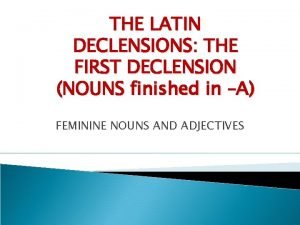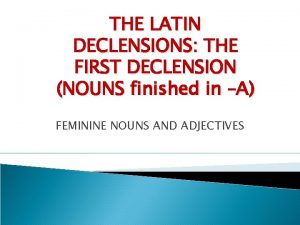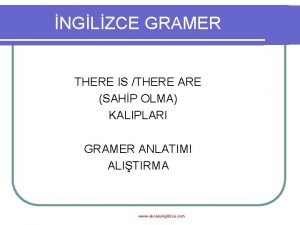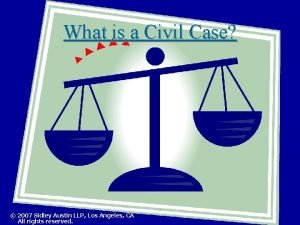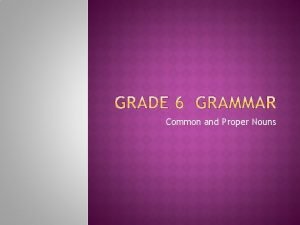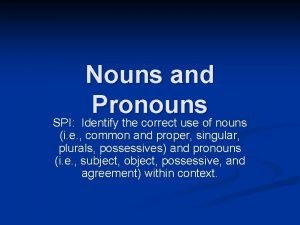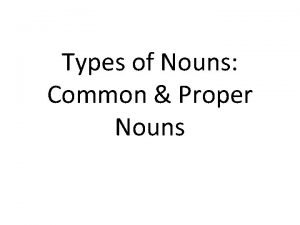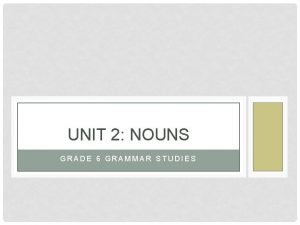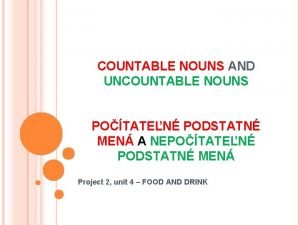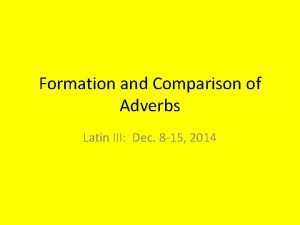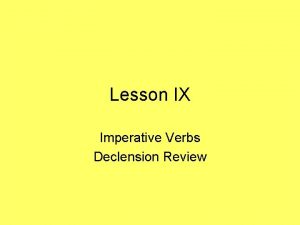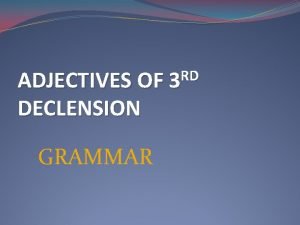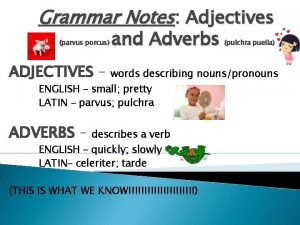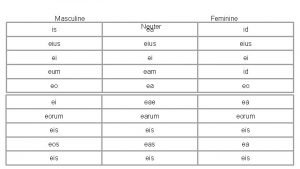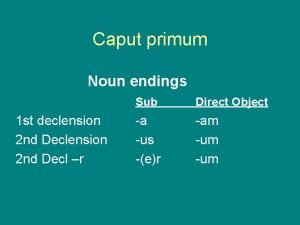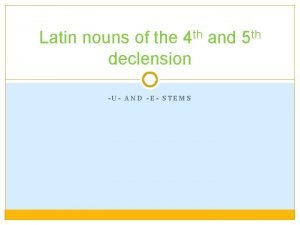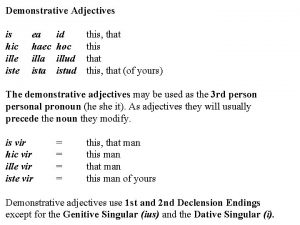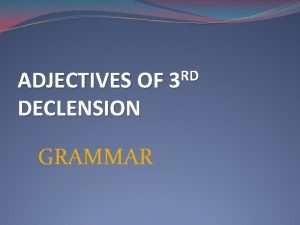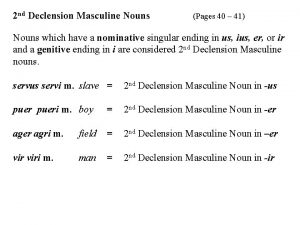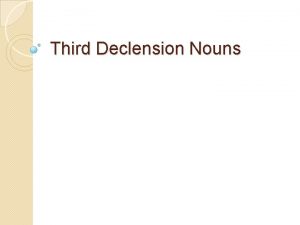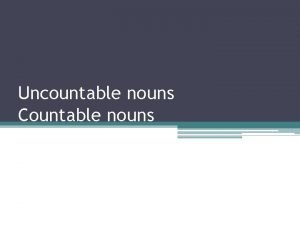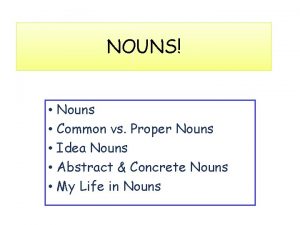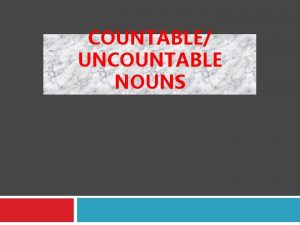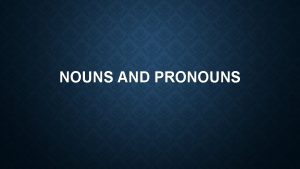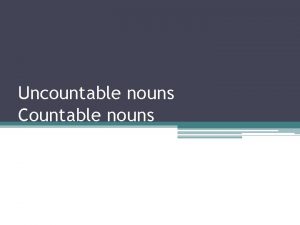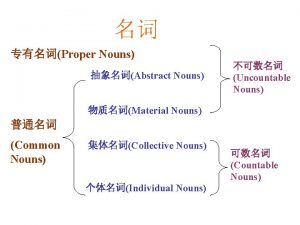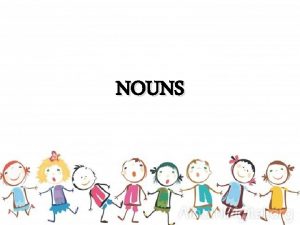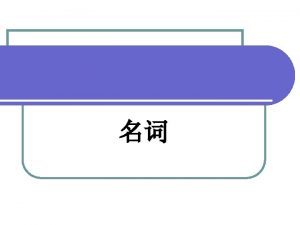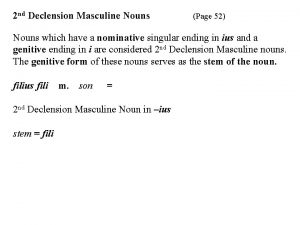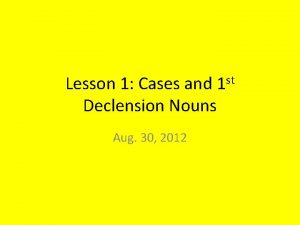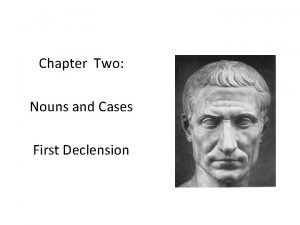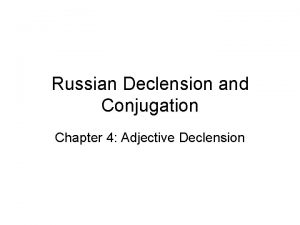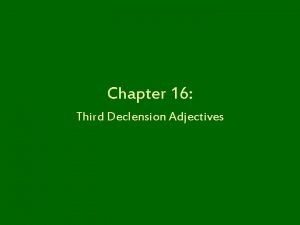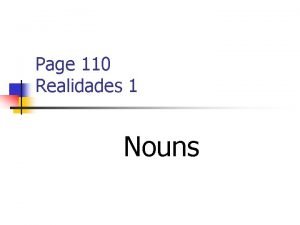Declension of Nouns There are 3 cases in






























- Slides: 30

Declension of Nouns There are 3 cases in Arabic. We know them by changing the vowelling of the final consonant in the word. They are: - The nominative case ﺍﻟﺮﻓﻊ It’s indicated with a damma

The accusative case: It’s indicated with a fatha The genitive case: It’s indicated with a kasra

The Genitive with Prepositions Every Arabic preposition takes its following noun in the genitive (prepositional phrase) ﺣﺮﻑ ﺍﻟﺠﺮ ﻭﺍﻻﺳﻢ ﺍﻟﻤﺠﺮﻭﺭ : ﺍﻟﺠﺎﺭ ﻭﺍﻟﻤﺠﺮﻭﺭ to work = ﺇﻟﻰ ﺍﻟﻌﻤﻞ from the student = ﻣﻦ ﺍﻟﻄﺎﻟﺒﺔ to the man = ( ﻟﻠﺮﺟﻞ belonging) for the student = ﻟﻠﻄﺎﻟﺐ On the table = ﻋﻠﻰ ﺍﻟﻤﺎﺋﺪﺓ in the garden = ﻓﻲ ﺍﻟﺒﺴﺘﺎﻥ

Nominal sentence: - subject = ﺍﻟﻤﺒﺘﺪﺃ predicate = ﺍﻟﺨﺒﺮ - When the nominal sentence has a prepositional phrase as a predicate, and the subject is indefinite = the subject is not usually placed first.

a man is in the garden ﺭﺟﻞ ﻓﻲ ﺍﻟﺒﺴﺘﺎﻥ X ﻓﻲ ﺍﻟﺒﺴﺘﺎﻥ ﺭﺟﻞ the man is in the garden ﺍﻟﺮﺟﻞ ﻓﻲ ﺍﻟﺒﺴﺘﺎﻥ ﺍﻟﺮﺟﻞ In such sentences, we can use the English impersonal verb = “there is , there are” There is a man in the garden


The Genitive of Possession ( )ﺍﻹﺿﺎﻓﺔ - When a noun is followed by another noun in the genitive automatically loses its nunation. ﺑﻴ ﺍﻟﺮﺟ X ﺑﻴ ﺍﻟﺮﺟ

- When the second noun is definite, the first noun is automatically definite. ﺑﻴ ﺍﻟﺮﺟ The house of the man - BUT if it’s intended that “house” should be indefinite with the meaning “a house of the man” implying he has other houses too we say: ﺑﻴ ﻟﻠﺮﺟﻞ

- A noun followed by a genitive must not take the article. ﺍﻟﺒﻴﺖ ﺍﻟﺮﺟﻞ X ﺑﻴ ﺍﻟﺮﺟ

- Nothing must interpose between the noun and its following genitive ﺍﻟﻤﻀﺎﻑ ﻭﺍﻟﻤﻀﺎﻑ ﺇﻟﻴﻪ So, if the noun is to be qualified with an adjective, the adjective should come AFTER the genitive: The man’s big house ﺑﻴ ﺍﻟﺮﺟ ﺍﻟﻜﺒﻴ

*Note that by altering the vowelling of the adjectives, different meanings are given: ﺑﻴ ﺍﻟﺮﺟ ﺍﻟﻜﺒﻴ The man’s big house ﺑﻴ ﺍﻟﺮﺟ ﺍﻟﻜﺒﻴ The old man’s house

It is possible to form the genitive of possession with an indefinite genitive, but in such cases the noun remains indefinite: ﻓﻨﺠﺎ ﻗﻬﻮ A cup of coffee ﻓﻨﺠﺎ ﻗﻬﻮ ﻛﺒﻴ A large cup of coffee

Nouns in English Nouns can be Countable Uncountable

Uncountable nouns 1. We can’t count them. So, they don’t have plural form. We can’t say: musics, bloods, golds, excitements, sugars… X 2. Before uncountable nouns you can say the/ some/ any/ much/ this/ her… etc The music, some gold, much excitement, his blood

3. You can’t use a/an before an uncountable noun. a music X an excitement X a blood X 4. You can also use uncountable nouns alone, with no article. This ring is made of gold – Blood is red

Many nouns can be used as countable or uncountable nouns. Usually there is a difference in meaning. PAPER I bought a paper ( a newspaper = countable ) Hand me your papers ( documents = countable) I bought some paper ( material for writing on = uncountable)

HAIR There is a hair in my soup! ( one single hair = countable) She has beautiful hair ( hair on her head = uncountable) EXPERIENCE We had many interesting experiences during our holiday. ( thing that happened to us = countable) You need experience for this job ( Knowledge of something because you have done it before)

4. Some nouns are usually uncountable in English but often countable in other languages. Accommodation ﺳﻜﻦ - ﻣﺴﻜﻦ – ﺍﺳﻜﺎﻥ Baggage ﺃﻤﺘﻌﺔ Behavior ﺳﻠﻮﻛﻴﺎﺕ - ﺳﻠﻮﻙ Bread ﺧﺒﺰ Advice ﻧﺼﻴﺤﺔ – ﻧﺼﺎﺋﺢ


These nouns are uncountable, so you can’t use (a, an) before them I’m looking for accommodation. I’m going to buy some bread. Tom gave me some good advice. Where are you going to put all your furniture?

Remember that news is not plural: The news is very depressing today. ( not the news are X) Don’t use travel to mean journey/trip: We had a good journey ( not a good travel X) I like travel but it’s tiring sometimes.

These pairs of countable and uncountable: I’m looking for a job ( C) I’m looking for work (UNC) The author has a lot of works (C) What a lovely view! (C) What lovely scenery! (UNC)

Revision Translate the following sentence: ﺍﻟﺒﻨ ﺍﻟﺠﻤﻴﻠ The beautiful girl ﺑﻨ ﺟﻤﻴﻠ A beautiful girl ﺍﻟﺒﻨ ﺟﻤﻴﻠ The girl is beautiful



How many long syllables and short syllables are in the following words: ﺍ Long syllables: 2 Short syllables: ﻳ Long syllables: 2 Short syllables: 1 Long syllables: Short syllables: 3 ﺍ Long syllables: 2 Short syllables : 3

She has long black ( hair / hairs) *hair Bad news ( don’t / doesn’t) make you happy. *doesn’t I have a lot of (work/ works ) to do. *work

True or False ? There are 4 short vowels in Arabic ( ) (F) 3 Sukoon is used to signify the absence of a consonant ( ) (F) Of a vowel Nunation is found at the end of nouns or adjectives when they are indefinite ( ) (T) Arabic syllables should be given their full length () (T)

We should insert “and” between two adjectives when they form the predicate of a nominal sentence ( ) (T) All words that end in ﺍﻟﺘﺎﺀ ﺍﻟﻤﺮﺑﻮﻃﺔ are feminine ( ) (F) There are some exception like ﺧﻠﻴﻔﺔ The ﺗﺎﺀ ﻣﺮﺑﻮﻃﺔ is added to a collective noun to indicate a single object ( ) (T)

 Antigentest åre
Antigentest åre 3rd declension latin nouns
3rd declension latin nouns Finished in latin
Finished in latin Latin third declension nouns
Latin third declension nouns Latin declension practice
Latin declension practice Countable and uncountable there is there are
Countable and uncountable there is there are Criminal cases vs civil cases
Criminal cases vs civil cases Identify common and proper nouns in paragraph
Identify common and proper nouns in paragraph Abrigo es singular o plural
Abrigo es singular o plural Count nouns and noncount nouns
Count nouns and noncount nouns Countable and uncountable nouns table
Countable and uncountable nouns table Four tomatoes
Four tomatoes Common nouns and proper nouns
Common nouns and proper nouns Common noun vs proper noun
Common noun vs proper noun Charles possessive
Charles possessive Potaten
Potaten Countable and uncountable
Countable and uncountable List of singular and plural
List of singular and plural Adverbs in latin
Adverbs in latin Hic haec hoc latin chart
Hic haec hoc latin chart Define genitive case
Define genitive case Acer declension
Acer declension Filia latin declension
Filia latin declension M adjectives
M adjectives Parvus declension
Parvus declension Ei ea id
Ei ea id Novenum
Novenum Facies hippocratica
Facies hippocratica Ille illa illud
Ille illa illud Nervus declension
Nervus declension Nominative genitive dative accusative ablative
Nominative genitive dative accusative ablative


